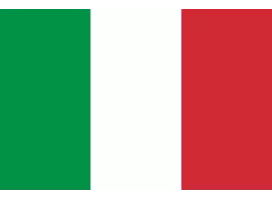Italy customs regulation
Import and Export laws of Italy
Italy is a medium sized country with around 61M Italian. Official language is Italian. Italy uses metric system (kilograms, centimeters, °C). Time zone is UTC+01:00 with daylight saving time. Currency used in Italy is Euro (EUR).
🏙️ Rome🗣️ Italian
👨👩👦👦 61M ☀️ ~12 °C 🌧 ~74 mm 👍 Developed 🚩 301k km2 (116k mi²)
Import Regulation
Tobacco 🚬
200 cigarettes;
100 cigarillos;
50 cigars;
250g of smoking tobacco; or
A proportional combination of these goods (such as 100 cigarettes and 50 cigarillos).
Currency 💵
There are no restrictions on the importation of currency into the EU.
Funds of more than €10,000 must be declared to the customs authorities.
Prohibited ⛔
Counterfeit goods.
Drugs, psychotropic and doping substances.
Restricted ⚠️
Cats, dogs, and ferrets are subject to a mandatory health inspection at the first point of entry on EU territory. They must also have a microchip or tattoo, and have been properly vaccinated against rabies. A Common Veterinary Entry Document certifying the healthy inspection must be provided with the customs declaration. Pets travelling within the EU must have a valid pet passport.
The importation of other animals, such as birds and tortoises, is allowed if the animals are accompanied by a health certificate issued by the authorities of the country from which the animals arrive.
Endangered animals, plants, and their derivative products protected under the Convention on International Trade in Endangered Species (CITES) may require protected species permits.
Cultural goods require a declaration to the customs office and an import certificate issued by the Export Office of the Ministry of Cultural Heritage and Activities and Tourism.
Weapons, firearms, and knives require authorisation issued by the competent body in the passenger's place of residence. Weapons may be deposited at the Customs Office until the authorisation needed is issued by the Office responsible for police force and public order.
Up to 10kg of meat and dairy products from the EU, Faroe Islands, Greenland and Iceland.
2kg of products of animal origin such as milk powder and baby food can be brought in packaged and does not need to be refrigerated.
Fish for personal use, disembowelled and weighing up to 20kgs.
Small quantities of fresh and dried vegetable products for personal use.
Other rules ℹ️
Medicines for personal use. If the quantity exceeds 30 days' worth, the Customs Authorities may ask the passenger to produce the prescription.
Personal items of non-commercial nature worth up to €430 when travelling by air or sea.
Personal items of non-commercial nature worth up to €300 when travelling by land.
Personal items of non-commercial nature worth up to €150 for travellers under 15 years of age.
Export Regulation
Prohibited ⛔
All items on the prohibited import list.
Restricted ⚠️
There are no restrictions on the export of currency if leaving for another EU country. Funds of more than €10,000 must be declared when leaving the EU.
Protected species and products protected under CITES. A permit is required for export.
Italian travellers wishing to take theirs furs out of the country will need a temporary admission certificate from the State Forestry Body.
Objects of cultural value, of historical or artistic interest or more than fifty years old require a license issued by the Exportation Office of the Ministry for Cultural Heritage and Activities and Tourism.
Countries nearby Italy
More on Italy travel and visa information
All the informations you need to schedule your trip to Italy.








